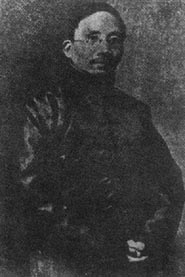Cai Yuanpei
Cai Yuanpei (Chinese: 蔡元培)(1868-1940), the leading liberal educator of early twentieth-century China, was best known for being the Republic of China’s first Minister of Education, Chancellor of Peking University, and the founder and first president of the Academia Sinica, China’s highest national research institute. He was also noted for his pioneering work in reforming the system of traditional education and for his efforts to synthesize Chinese and Western educational ideas.
Biographical sketch
Cai Yuanpei was born on January 11, 1868 in Shaoxing, Zhejiang Province. As his father was the manager of a local bank, Cai had a comfortable family life. This enabled him to receive a traditional education which concentrated on knowledge of the classics and to successfully complete the civil-service examinations. At the age of 22, Cai earned the title of jinshi (doctorate) and became a member of the Hanlin Academy, the highest honor accorded to a scholar in feudal China. In 1894 he was promoted to the rank of compiler at the Hanlin Academy.
As the Sino-Japanese War of 1894-95 demonstrated China’s weakness in the face of Western science and technology, Cai decided to turn away from compiling the classics and began working on translations of European books in order to understand the reasons behind Western successes. From this period onwards, he spent much time teaching in various government and private schools, trying to disseminate the new ideas from the West. In 1901, educators in Shanghai set up the Chinese Educational Association and elected Cai Yuanpei president.
In 1902, he co-established the Patriotic School and Patriotic Women School and founded a newspaper to advocate civil rights and propagate revolution.
In 1907, Cai went to Germany and enrolled at Leipzig University where he took courses in philosophy, aesthetics, anthropology and experimental psychology. During his stay in Germany, he compiled a series of textbooks for middle schools on moral education, wrote The History of Chinese Ethics, and translated several German books into Chinese.
On his return to China in 1911 he was appointed Minister of Education by the Republican government. Cai advocated school system reform, establishing coeducational schools and abolishing the study of ancient Chinese classics. In protest against Yuan Shikai’s autocratic rule, Cai resigned from the post in 1912 and returned to his studies in Germany. In 1913, he moved to France where he studied French and assisted in running the Educational Institute for Chinese Laborers and in organizing the Sino-French Educational Association.
In 1916, Cai was appointed Chancellor of Peking University and held this position until 1926. During the ten-year period, his devotion to independent thinking, his innovative experimentation and encouragement of young talent helped to develop the university into a major institution of higher education in China.
In 1927, he was named president of the Daxueyuan (the University Council), which replaced the former Ministry of Education. Early in 1928, he was instrumental in founding the Academia Sinica, which was designed to advance national research in science and technology. The Academia Sinica, with Cai as its first president, did much to raise the level of scientific research in China.
After retirement from public life, Cai fell ill in 1936 and died on March 5, 1940 in Hong Kong at the age of 72.
